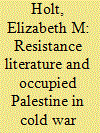|
|
|
Sort Order |
|
|
|
Items / Page
|
|
|
|
|
|
|
| Srl | Item |
| 1 |
ID:
193011


|
|
|
|
|
| Summary/Abstract |
In Fi al-adab al-sahyuni (On Zionist Literature, 1967)Footnote1, the Palestinian writer and Popular Front for the Liberation of Palestine (PFLP) spokesperson Ghassan Kanafani provides an analysis of Zionist literary production from the early nineteenth century through the mid-twentieth century, situating it in a broader schema of Western imperialism, settler colonialism, and dispossession in Palestine. Through a treatment of the early Zionist texts, Kanafani’s study traces the evolution of literary representations of the Jewish subject and explores their utility in repudiating integration and advancing racial supremacist logics. The Zionist works in question venerate different relationships to land—extractive, romantic, fraudulent—in contrast to those of Palestinian literary and oral traditions; the former are connected to the ongoing, material efforts of colonizing Palestine. Kanafani’s study was drafted in Beirut and is a reflection of the broader sweep of Arab nationalist and anti-colonial cultural production during the 1960s and 1970s, which was targeted by an anti-communist West. These experiences were formative for Kanafani’s intellectual project, which sees literary criticism as a revolutionary tool and a direct extension of armed resistance, whereby a cultural reconstitution can be used in service of liberating both Palestinian land and people. Kanafani’s study suggests that the “weapons” of literary production will be most effectively brandished by the Arab youth who lead the struggle against Zionism.
|
|
|
|
|
|
|
|
|
|
|
|
|
|
|
|
| 2 |
ID:
178330


|
|
|
|
|
| Summary/Abstract |
For the last decade of his life, the Palestinian intellectual, author, and editor Ghassan Kanafani (d. 1972) was deeply immersed in theorizing, lecturing, and publishing on Palestinian resistance literature from Beirut. A refugee of the 1948 war, Kanafani presented his theory of resistance literature and the notion of “cultural siege” at the March 1967 Beirut conference of the Soviet-funded Afro-Asian Writers Association (AAWA). Articulated in resistance to Zionist propaganda literature and in solidarity with Marxist-Leninist revolutionary struggles in the Third World, Kanafani was inspired by Maxim Gorky, William Faulkner, and Mao Zedong alike. In books, essays, and lectures, Kanafani argued that Zionist propaganda literature served as a “weapon” in the war against Palestine, returning repeatedly to Arthur Koestler’s 1946 Thieves in the Night. Better known for his critique of Stalinism in Darkness at Noon (1940), Koestler was also actively involved in waging cultural Cold War, writing the United States Central Intelligence Agency’s (CIA) Congress for Cultural Freedom 1950 manifesto and helping the organization infiltrate Afro-Asian writing in the wake of Bandung. Kanafani’s 1960s theory of resistance literature thus responded at once to the psychological dislocation of Zionist propaganda fiction and the cultural infiltration of Arabic literature in the Cold War.
|
|
|
|
|
|
|
|
|
|
|
|
|
|
|
|
|
|
|
|
|